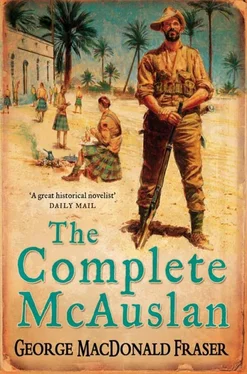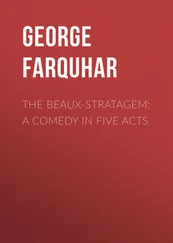The day came, and disaster struck immediately. The sentry at the main gate turned out the guard at the approach of the General’s car, and dropped his rifle in presenting arms. That was fairly trivial, but the General commented on it as he stepped out to be welcomed by the Colonel, and that put everyone’s nerves on edge; matters were not improved by the obvious fact that he was pleased to have found a fault so early, and was intent on finding more.
He didn’t have far to look. He was a big, beefy man, turned out in a yellowing balmoral and an ancient, but beautifully cut kilt, and his aide was seven feet of sideways invisibility in one of the Guards regiments. The General announced that he would begin with the men’s canteen (“men’s welfare comes first with me; should come first with every officer”), and in the panic that ensued on this unexpected move the canteen staff upset a swill-tub in the middle of the floor five seconds before he arrived; it had been a fine swill-tub, specially prepared to show that we had such things, and he shouldn’t have seen it until it had been placed at a proper distance from the premises.
The General looked at the mess, said “Mmh,” and asked to see the medical room (“always assuming it isn’t rife with bubonic plague”); it wasn’t, as it happened, but the M.O.’s terrier had chosen that morning to give birth to puppies, beating the Adjutant to it by a short head. Thereafter a fire broke out in the cookhouse, a bren-gun carrier broke down, an empty cigarette packet was found in “B” company’s garden, and Private McAuslan came back off leave. He was tastefully dressed in shirt and boots, but no kilt, and entered the main gate in the company of three military policemen who had foolishly rescued him from a canal into which he had fallen. The General noted his progress to the guardroom with interest; McAuslan was alternately singing the Twenty-third Psalm and threatening to write to his Member of Parliament.
So it went on; anything that could go wrong, seemed to go wrong, and by dinner-time that night the General was wearing a sour and satisfied expression, his aide was silently contemptuous, the battalion was boiling with frustration and resentment, and the Colonel was looking old and ill. Only once did he show a flash of spirit, and that was when the junior subaltern passed the port the wrong way again, and the General sighed, and the Colonel caught the subaltern’s eye and said loudly and clearly: “Don’t worry, Ian; it doesn’t matter a damn.”
That finally froze the evening over, so to speak, and when we were all back in the ante-room and the senior major remarked that the pipe-sergeant was all set for the dancing to begin, the Colonel barely nodded, and the General lit a cigar and sat back with the air of one who was only mildly interested to see how big a hash we could make of this too.
Oddly enough, we didn’t. We danced very well, with the pipe-sergeant fidgeting on the outskirts, hoarsely whispering, “One, two, three,” and afterwards he and the Adjutant and two of the best subalterns danced a foursome that would have swept the decks at Braemar. It was good stuff, really good, and the General must have known it, but he seemed rather irritated than pleased. He kept moving in his seat, frowning, and when we had danced an eightsome he finally turned to the Colonel.
“Yes, it’s all right,” he said. “But, you know, I never cared much for the set stuff. Did you never dance a sixteensome?”
The Colonel said he had heard of such a thing, but had not, personally, danced it.
“Quite simple,” said the General, rising. “Now, then. Eight more officers on the floor. I think I remember it, although it’s years now …”
He did remember; a sixteensome is complicated, but its execution gives you the satisfaction that you get from any complex manoeuvre; we danced it twice, the General calling the changes and clapping (his aide was studying the ceiling with the air of an archbishop at a cannibal feast), and when it was over the General actually smiled and called for a large whisky. He then summoned the pipe-sergeant, who was looking disapproving.
“Pipe-sergeant, tell you what,” said the General. “I have been told that back in the ’nineties the First Black Watch sergeants danced a thirty-twosome. Always doubted it, but suppose it’s possible. What do you think? Yes, another whisky, please.”
The pipe-sergeant, flattered but slightly outraged, gave his opinion. All things were possible; right, said the General, wiping his mouth, we would try it.
The convolutions of an eightsome are fairly simple; those of a sixteensome are difficult, but a thirty-twosome is just murder. When you have thirty-two people weaving and circling it is necessary that each one should move precisely right, and that takes organisation. The General was an organiser; his tunic came off after half an hour, and his voice hoarsely thundered the time and the changes. The mess shook to the crash of feet and the skirling of the pipes, and at last the thirty-twosome rumbled, successfully, to its ponderous close.
“Dam’ good! Dam’ good!” exclaimed the General, flushed and applauding. “Well danced, gen’men. Good show, pipe-sarn’t! Thanks, Tom, don’t mind if I do. Dam’ fine dancing. Thirty-twosome, eh? That’ll show the Black Watch!”
He seemed to sway a little as he put down his glass. It was midnight, but he was plainly waking up.
“Thirty-twosome, by Jove! Wouldn’t have thought it possible.” A thought seemed to strike him. “I say, pipesarn’t, I wonder … d’you suppose that’s as far as we can go? I mean is there any reason …?”
He talked, and the pipe-sergeant’s eyes bulged. He shook his head, the General persisted, and five minutes later we were all outside on the lawn and trucks were being sent for so that their headlights could provide illumination, and sixty-four of us were being thrust into our positions, and the General was shouting orders through cupped hands from the veranda.
“Taking the time from me! Right, pipers? It’s p’fickly simple. S’easy. One, two, an’ off we go!”
It was a nightmare, it really was. I had avoided being in the sixty-four; from where I was standing it looked like a crowd scene from “The Ten Commandments”, with the General playing Cecil de Mille. Officers, mess-waiters, batmen, swung into the dance as the pipes shrilled, setting to partners, circling forwards and back, forming an enormous ring, and heughing like things demented. The General bounded about the veranda, shouting; the pipe-sergeant hurtled through the sets, pulling, directing, exhorting; those of us watching clapped and stamped as the mammoth dance surged on, filling the night with its sound and fury.
It took, I am told, one hour and thirteen minutes by the Adjutant’s watch, and by the time it was over the Fusiliers from the adjoining barracks were roused and lined along the wall, assorted Arabs had come to gaze on the wonders of civilisation, and the military police mobile patrol was also on hand. But the General was tireless; I have a vague memory of him standing on the tailboard of a truck, addressing the assembled mob; I actually got close enough to hear him exhorting the pipe-sergeant in tones of enthusiasm and entreaty:
“Pipe-sarn’t! Pipey! May I call you Pipey? … never been done … three figures … think of it … hunner’n-twenty-eightsome … never another chance … try it … rope in the Fusiliers … massed pipers … regimental history … please, Pipey, for me …”
Some say that it actually happened, that a one hundred and twenty-eightsome reel was danced on the parade ground that night, General Sir Roderick MacCrimmon, K.C.B., D.S.O., and bar, presiding; that it was danced by Highlanders, Fusiliers, Arabs, military police, and three German prisoners of war; that it was danced to a conclusion, all figures. It may well have been; all I remember is a heaving, rushing crowd, like a mixture of Latin Carnival and Scarlett’s uphill charge at Balaclava, surging ponderously to the sound of the pipes; but I distinctly recall one set in which the General, the pipe-sergeant, and what looked like a genuine Senussi in a burnous, swept by roaring, “One, two, three,” and I know, too, that at one point I personally was part of a swinging human chain in which my immediate partners were the Fusiliers’ cook-sergeant and an Italian café proprietor from down the road. My memory tells me that it rose to a tremendous crescendo just as the first light of dawn stole over Africa, and then all faded away, silently, in the tartan-strewn morning.
Читать дальше












